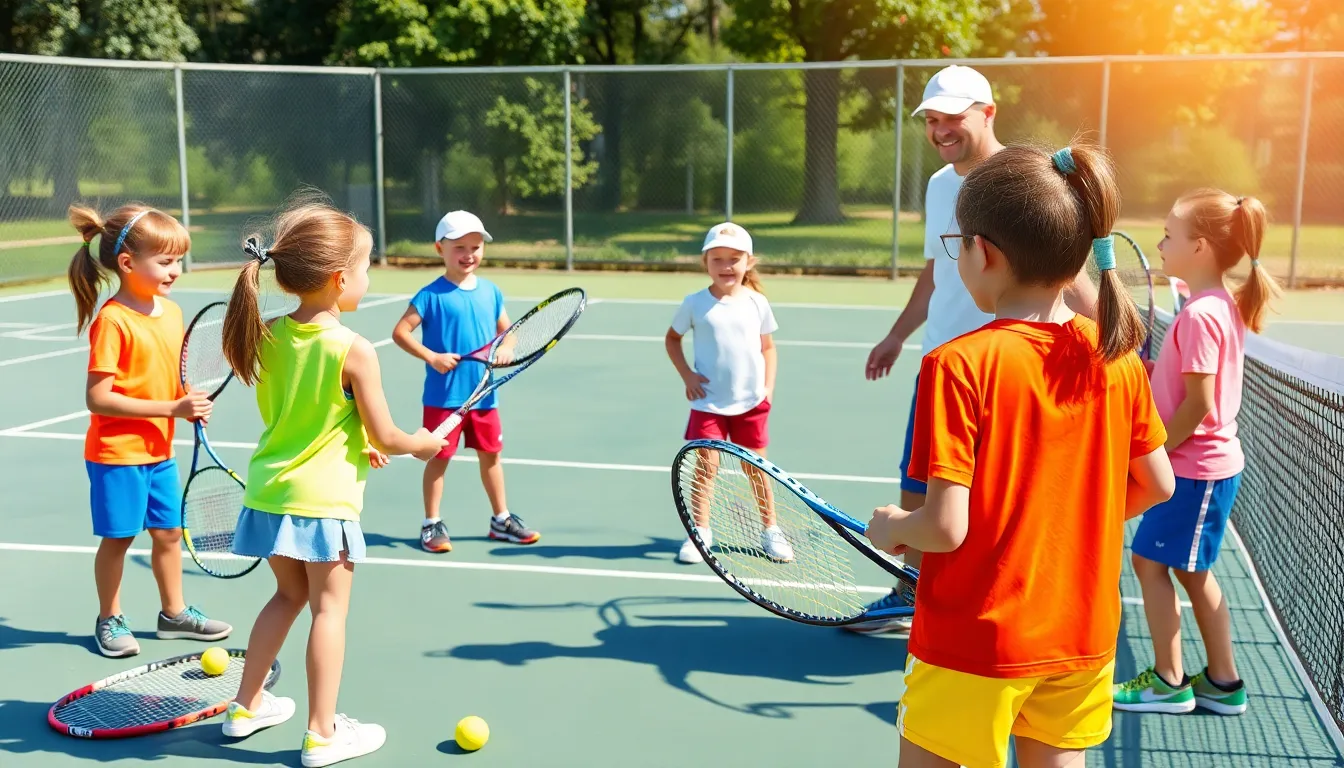Table of Contents
ToggleTennis isn’t just for the pros; it’s for kids too! Imagine your little one swinging a racket like a mini Roger Federer or Serena Williams. Kids tennis lessons offer not just a chance to learn the game but also a fun way to build confidence, make friends, and burn off that endless energy. Who knew running around a court could be so much more entertaining than chasing after a rogue puppy?
Benefits of Kids Tennis Lessons
Kids tennis lessons offer multiple benefits that promote overall development. These advantages encompass physical health, mental well-being, and social skills.
Physical Health Benefits
Tennis enhances physical fitness in children. The sport promotes cardiovascular health through consistent aerobic activity. Coordination improves as kids develop their hand-eye skills while hitting the ball. Additionally, muscle strength builds through repetitive movements. Engaging in tennis can also help maintain a healthy weight, reducing risks associated with obesity. Overall, these health aspects lead to a more active lifestyle among young players.
Mental and Social Benefits
Participating in tennis fosters confidence in children. As they master techniques, they experience a sense of achievement. Social skills advance through interactions with peers during lessons and matches. Children learn teamwork while understanding the importance of fair play and sportsmanship. Mental resilience develops as they navigate both wins and losses, teaching them to cope with challenges effectively. Such experiences enrich their emotional intelligence and provide lasting friendships.
What to Expect in Kids Tennis Lessons

Kids tennis lessons offer a structured environment for learning the sport while having fun. Students can anticipate engaging experiences that promote growth in many areas.
Lesson Structure
Each lesson follows a set structure designed to maximize learning. Warm-ups introduce physical activity, preparing students for play. Drills focus on fundamental skills like serving, volleying, and footwork, reinforcing technique through repetition. Coaches incorporate games and competitions to motivate kids and maintain interest. Group activities encourage teamwork, helping students build friendships. All session components contribute to a comprehensive introduction to tennis.
Skill Development
Skill development occurs at multiple levels during lessons. Coaches tailor training to individual needs, focusing on both technical and strategic aspects of the game. As kids progress, they enhance hand-eye coordination, agility, and endurance. Improvement in these areas not only aids tennis performance but also boosts overall physical fitness. Emotional benefits arise, too, with increased confidence as students master their skills. Social skills flourish through interaction, teaching kids important values like respect and sportsmanship.
Choosing the Right Tennis Program
Selecting the right tennis program involves careful consideration to match a child’s needs with the appropriate curriculum. A suitable environment encourages enjoyment and skill development.
Factors to Consider
Age appropriateness plays a key role in program selection. Look for programs designed for specific age groups to ensure the lessons cater to developmental stages. Class size influences individual attention, as smaller groups typically provide more personalized instruction. Additionally, experience and qualifications of instructors matter; certified coaches often bring valuable expertise to lessons. Both location and facilities should align with convenience and accessibility for families, promoting regular attendance.
Questions to Ask Instructors
Inquiring about lesson structure can reveal the program’s effectiveness. Ask about the frequency and duration of lessons to ensure they align with your child’s needs. Understanding how instructors adapt curriculums for different skill levels helps assess personalized attention. Questions regarding safety protocols ensure a secure environment during lessons. Finally, asking about progress tracking provides insights into how children’s development is monitored, ensuring goals are met effectively.
Tips for Parents to Support Learning
Parents play a crucial role in their child’s tennis journey. Supportive actions can significantly enhance learning and development.
Encouragement and Motivation
Encouragement boosts a child’s confidence and enjoyment of tennis. Applauding achievements, big or small, reinforces their effort and dedication. Setting realistic goals helps children focus, providing them with clear targets to strive for. Celebrating milestones, like mastering a new skill or improving performance, fosters a sense of accomplishment. Positive reinforcement, such as verbal praise or small rewards, significantly motivates kids to engage in practice and lessons. Staying involved by attending matches and supporting their efforts strengthens the parent-child bond, cultivating their passion for tennis.
At-Home Practice Ideas
At-home practice offers valuable opportunities for skill development. Simple drills, like wall bounces, enhance ball control and hand-eye coordination. Creating a mini tennis court using chalk or cones allows for fun and engaging games. Setting up a practice schedule encourages consistency, reinforcing discipline and commitment. Engaging in fitness activities like jogging or jumping rope builds endurance, essential for tennis performance. Sharing informative videos on techniques and strategies inspires kids to learn outside of lessons. Encouraging them to watch professional matches helps them understand game dynamics and fosters excitement for their own practice.
Kids tennis lessons offer a fantastic way for children to grow both physically and emotionally. By engaging in this sport, they not only enhance their physical fitness but also develop essential social skills and mental resilience. The structured environment of lessons ensures that kids learn effectively while having fun.
Choosing the right program plays a crucial role in maximizing these benefits. Parents can support their child’s journey by staying involved and encouraging their progress. With the right guidance and motivation, tennis can become a lifelong passion that nurtures confidence and fosters meaningful friendships. Embracing this sport opens doors to a healthier and happier lifestyle for children.





